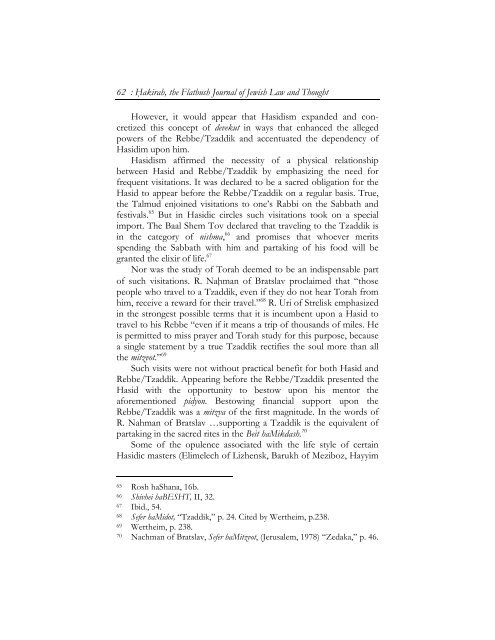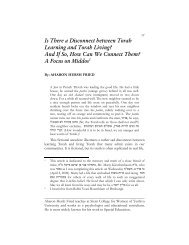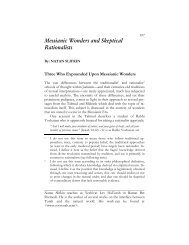Hasidism and the Rebbe/Tzaddik: The Power and Peril of ... - Hakirah
Hasidism and the Rebbe/Tzaddik: The Power and Peril of ... - Hakirah
Hasidism and the Rebbe/Tzaddik: The Power and Peril of ... - Hakirah
Create successful ePaper yourself
Turn your PDF publications into a flip-book with our unique Google optimized e-Paper software.
62 : Ḥakirah, <strong>the</strong> Flatbush Journal <strong>of</strong> Jewish Law <strong>and</strong> Thought<br />
However, it would appear that <strong>Hasidism</strong> exp<strong>and</strong>ed <strong>and</strong> concretized<br />
this concept <strong>of</strong> devekut in ways that enhanced <strong>the</strong> alleged<br />
powers <strong>of</strong> <strong>the</strong> <strong>Rebbe</strong>/<strong>Tzaddik</strong> <strong>and</strong> accentuated <strong>the</strong> dependency <strong>of</strong><br />
Hasidim upon him.<br />
<strong>Hasidism</strong> affirmed <strong>the</strong> necessity <strong>of</strong> a physical relationship<br />
between Hasid <strong>and</strong> <strong>Rebbe</strong>/<strong>Tzaddik</strong> by emphasizing <strong>the</strong> need for<br />
frequent visitations. It was declared to be a sacred obligation for <strong>the</strong><br />
Hasid to appear before <strong>the</strong> <strong>Rebbe</strong>/<strong>Tzaddik</strong> on a regular basis. True,<br />
<strong>the</strong> Talmud enjoined visitations to one’s Rabbi on <strong>the</strong> Sabbath <strong>and</strong><br />
festivals. 65 But in Hasidic circles such visitations took on a special<br />
import. <strong>The</strong> Baal Shem Tov declared that traveling to <strong>the</strong> <strong>Tzaddik</strong> is<br />
in <strong>the</strong> category <strong>of</strong> nishma, 66 <strong>and</strong> promises that whoever merits<br />
spending <strong>the</strong> Sabbath with him <strong>and</strong> partaking <strong>of</strong> his food will be<br />
granted <strong>the</strong> elixir <strong>of</strong> life. 67<br />
Nor was <strong>the</strong> study <strong>of</strong> Torah deemed to be an indispensable part<br />
<strong>of</strong> such visitations. R. Naḥman <strong>of</strong> Bratslav proclaimed that “those<br />
people who travel to a <strong>Tzaddik</strong>, even if <strong>the</strong>y do not hear Torah from<br />
him, receive a reward for <strong>the</strong>ir travel.” 68 R. Uri <strong>of</strong> Strelisk emphasized<br />
in <strong>the</strong> strongest possible terms that it is incumbent upon a Hasid to<br />
travel to his <strong>Rebbe</strong> “even if it means a trip <strong>of</strong> thous<strong>and</strong>s <strong>of</strong> miles. He<br />
is permitted to miss prayer <strong>and</strong> Torah study for this purpose, because<br />
a single statement by a true <strong>Tzaddik</strong> rectifies <strong>the</strong> soul more than all<br />
<strong>the</strong> mitzvot.” 69<br />
Such visits were not without practical benefit for both Hasid <strong>and</strong><br />
<strong>Rebbe</strong>/<strong>Tzaddik</strong>. Appearing before <strong>the</strong> <strong>Rebbe</strong>/<strong>Tzaddik</strong> presented <strong>the</strong><br />
Hasid with <strong>the</strong> opportunity to bestow upon his mentor <strong>the</strong><br />
aforementioned pidyon. Bestowing financial support upon <strong>the</strong><br />
<strong>Rebbe</strong>/<strong>Tzaddik</strong> was a mitzva <strong>of</strong> <strong>the</strong> first magnitude. In <strong>the</strong> words <strong>of</strong><br />
R. Nahman <strong>of</strong> Bratslav …supporting a <strong>Tzaddik</strong> is <strong>the</strong> equivalent <strong>of</strong><br />
partaking in <strong>the</strong> sacred rites in <strong>the</strong> Beit haMikdash. 70<br />
Some <strong>of</strong> <strong>the</strong> opulence associated with <strong>the</strong> life style <strong>of</strong> certain<br />
Hasidic masters (Elimelech <strong>of</strong> Lizhensk, Barukh <strong>of</strong> Meziboz, Hayyim<br />
65 Rosh haShana, 16b.<br />
66 Shivhei haBESHT, II, 32.<br />
67 Ibid., 54.<br />
68 Sefer haMidot, “<strong>Tzaddik</strong>,” p. 24. Cited by Wer<strong>the</strong>im, p.238.<br />
69 Wer<strong>the</strong>im, p. 238.<br />
70 Nachman <strong>of</strong> Bratslav, Sefer haMitzvot, (Jerusalem, 1978) “Zedaka,” p. 46.

















